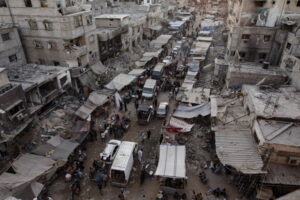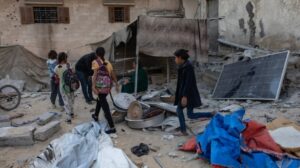The Israeli government yesterday agreed to resume talks next Thursday, August 15, aimed at declaring a ceasefire in the Gaza Strip and releasing hostages remaining in the hands of Hamas, following intervention by the mediating countries, the US, Egypt and Qatar, which warned the belligerents that “there is no time to waste nor excuse” for further delays.
The announcement was recorded as hostilities continue in the Palestinian enclave, and after at least 18 people died yesterday in Israeli shelling of two schools, and against a backdrop of concerns of a Middle East conflagration.
“Following the offer of the US and the mediators, Israel will send a delegation of negotiators on August 15 to a location to be determined in order to finalize the details and implement the framework agreement,” according to a statement released by Israeli Prime Minister Benjamin Netanyahu’s office.
Earlier, Washington, Cairo and Doha invited the rival parties to resume indirect negotiations on August 15, stressing that there is already a framework agreement “on the table right now” and that all that remains is to agree on “the details of its implementation.”
“As mediators we are ready, if necessary, to present a final proposal that resolves the implementation issues (of a possible agreement) in a way that meets the expectations of all sides,” they added.
Doha has been spearheading negotiations for months, with the support of Cairo and Washington, to conclude a ceasefire agreement, accompanied by the release of hostages held in the Gaza Strip in exchange for the release of Palestinians held in Israel.
The prospect of an end to hostilities is intended to become a reality on the basis of a phased agreement, starting with a ceasefire.
The talks are based on the framework presented by US President Joe Biden at the end of May; it was, according to him, an Israeli proposal.
The framework agreement referred to by the mediating countries was “based on the principles” put forward by Mr Biden, according to their joint statement yesterday.
“It is time to conclude a ceasefire agreement and an agreement on the release of hostages and prisoners,” according to the document. “There is no time to waste and no excuses for either party to seek further delay.”
This does not mean, however, that “an agreement is ready to be signed on Thursday. A lot of work remains to be done,” a senior Biden administration official said, however, referring to the U.S. president’s talks with the leaders of Egypt and Qatar.
Israel seemed “very receptive” to the idea of resuming talks, the official said on condition of anonymity, rejecting criticism that Netanyahu was stalling, or delaying things.
The development was recorded after Hamas named as its new leader Yahya Shinwar, who is accused by Israeli authorities of being among the brains behind the October 7 raid by the military arm of the Palestinian Islamist movement on the southern part of Israeli territory, the trigger for the war. His elevation to the leadership of the Politburo after the death of his predecessor, Ismail Haniyah, in Tehran – Iran and Hamas blamed Israel for his assassination and vowed revenge – is thought to have made indirect negotiations even more difficult. The Israeli army, moreover, has vowed to “eliminate” Mr Shinar.
Since November, all mediation efforts have failed and the war, which Hamas’s health ministry says has claimed the lives of some 40,000 people in the small besieged enclave, has raised the thermometer even higher in the Middle East, where the war threatens to spread between Iran and armed organisations it supports on the one hand and Israel and its own allies, the main one being the US.
Diplomatic efforts continue to prevent regional flare-ups following the killings of Haniya and Sukr.
However, Iranian caretaker Foreign Minister Ali Bayeri stressed yesterday in an interview with the AFP in Jeddah, Saudi Arabia, that Israel had made a “strategic mistake” that would “cost it dearly.”
Mr Bayeri accused Mr Netanyahu’s government – which has yet to make any official comment on the death of Ismail Haniyah – of wanting to “spread the war”.
On the other hand, a US official has suggested that Iran will suffer “significant” consequences if it decides to attack Israel.
The US armed forces announced that F-22 fighter jets arrived in the Middle East yesterday. They had announced last week that they would increase their military presence in the region.
In Lebanon, where there have been repeated low-altitude overflights of Israeli military aircraft, the situation remains on a knife-edge. The exchanges of fire between the Israeli army and the Lebanese Hezbollah, practically daily since the day after the outbreak of the war in the Gaza Strip, continue.
Israeli Defence Minister Yoav Galad warned yesterday (Thursday) that Israel would fight Hezbollah “with all its might” if it continued its attacks, in a message translated into Arabic and addressed to the Lebanese population, released yesterday by his services. “Remember how much (Hezbollah leader Hassan) Nasrallah regretted the dangerous and reckless adventure of August 2006, learn lessons from the past to avoid a dangerous scenario repeating itself in August 2024,” he continued, referring to the 34-day war of 2006.
In the Gaza Strip, Israeli operations have not stopped against Hamas, in power in the enclave since 2007, a movement designated a terrorist organization by Israel, the EU and the US.
In Gaza City, Israeli shelling of two schools killed “more than 18 civilians” yesterday, according to civil defense spokesman Mohammad al-Mughayir, who added that 60 other people were wounded and more than 40 were missing.
For its part, the Israeli army said the schools were “used by terrorists and Hamas commanders” and that attacks were “planned” there and “launched” from there.
Still yesterday, the Israeli armed forces ordered, once again, civilians to be hurriedly evacuated from sectors of Khan Younis, a large city in the southern part of the enclave that has already suffered huge damage in months of fighting.
The order covers neighborhoods from which “rockets were fired,” according to the Israeli army.
The Civil Defense said five bodies were recovered from a house shelled in Khan Younis.
The Hamas offensive in southern Israel on October 7 killed 1,198 people, most of them civilians, according to a French News Agency count based on official Israeli data. Of the 251 people kidnapped that day, 111 are still being held hostage in Gaza, but 39 are believed to be dead, according to the Israeli military.
Israeli military retaliatory operations have since caused a humanitarian disaster in the Gaza Strip – forcing the vast majority of the 2.4 million population to be displaced and putting it at risk of famine, according to the UN.
Ask me anything
Explore related questions





